Stoke City Council and Queen’s Park Trust
Queens Park is an urban parkland situated in the heart of Shalford, Stoke-on-Trent. A key feature of the parkland is its chain of fishing ponds which provide a water quality improvement function for the local river catchment, as well as a recreation amenity for local residents.
The management partnership of Stoke City Council and the Queens Park Trust (a registered charity) recently awarded Keystone Habitats the contract to supply and install macrophyte planting on the margins of the fishing ponds.
What Did We Do?
- Installed 45 m of pre-vegetated coir to assist with water quality improvement through filtration and nutrient uptake
- Created a naturally enhanced amenity for public viewing
- Created habitat benefits for wildlife including aquatic invertebrates, fish and birds
How Did We Do It?
- Pre-vegetated coir logs – a natural fibre product, pre-planted with a range of macrophyte species were used to avoid the need to re-profile existing banks. Where necessary, Hazel faggots were also used to achieve the desired height for macrophyte planting
- Water levels were discussed with the client to agree the correct height for macrophyte planting and prevent failure post planting due to desiccation or excessive water logging
- The coir log/ hazel faggot combinations were secured in place on the edge of the fishing pond by driving a series of chestnut stakes into the pond substrate and wiring the coir logs onto them. Chestnut was selected over soft woods as a longer lasting solution
- To protect the young, vulnerable plants from bird predation, a chicken wire ‘dome’ was fashioned over the top of the planted coir log and secured to the chestnut stakes. The ends were wired together to completely prevent entry by birds
- Chestnut stakes were cut to height by hand to avoid the risk of bar oil from chainsaws polluting the lake
- All excess materials were removed from site
What were the Outcomes?
- The project was delivered in two days, a far quicker delivery time than if bank re-profiling was carried out instead
- The project was delivered on a very tight budget with effective project management being the key to ensuring plant growth times matched key delivery dates
- The planting was a success
This entry was posted in Case Studies, Forestry and Rural, Habitats. Bookmark the
permalink. Both comments and trackbacks are currently closed.
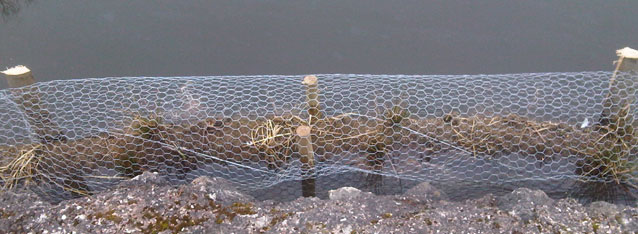
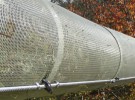

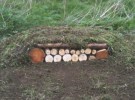


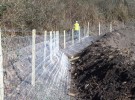
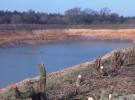


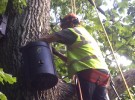

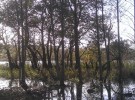
Angling Lake Marginal Planting
Stoke City Council and Queen’s Park Trust
Queens Park is an urban parkland situated in the heart of Shalford, Stoke-on-Trent. A key feature of the parkland is its chain of fishing ponds which provide a water quality improvement function for the local river catchment, as well as a recreation amenity for local residents.
The management partnership of Stoke City Council and the Queens Park Trust (a registered charity) recently awarded Keystone Habitats the contract to supply and install macrophyte planting on the margins of the fishing ponds.
What Did We Do?
How Did We Do It?
What were the Outcomes?